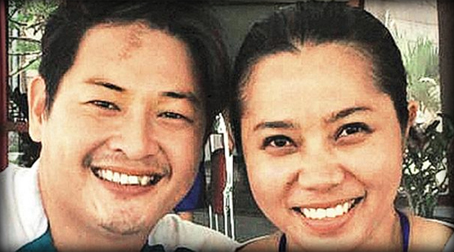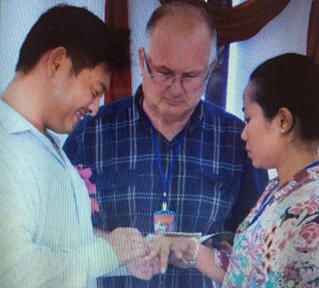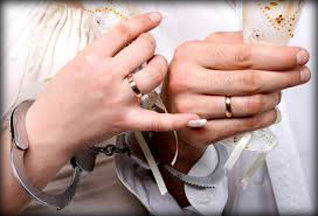|

Chan married fiancée Febyanti Herewila on Nusakambangan
Island, also known as 'execution island' on Monday night
(April 27). |
'I do' before 'I die'
A moment of brave humanity in the face of pain:
Last week, an Australian man on death row in Indonesia had his last
wish granted: to marry his fiancée. The Telegraph's Jemima Thackray
questions the sense of committing to a life-long union, when one of the
couple is about to die
An Australian man on death row in Indonesia, Andrew Chan, has had his
last wish granted: to marry his Indonesian fiancée.
Chan along with eight other Australians, was arrested in 2005 for
trying to smuggle heroin out of the country to Australia.
Indonesia executed Chan and fellow Australian Myuran Sukumaran, along
with six others convicted of drug charges, including a Brazilian man,
four Nigerians and an Indonesian man. A Filipino woman was given a
reprieve of sorts. The prisoners were given 72 hours notice of their
executions.
It was under these conditions that 31-year-old Chan wed Febyanti
Herewila at a ceremony believed to be in the prison, just hours before
he faced the firing squad.
|

Footage of Andrew Chan marrying his love Febyanti Herewila
aired on TV One Indonesia. |
"It's tough times but it's happy times at the same time," said
Michael Chan, the prisoner's brother. "It was an enjoyable moment. We
would just like to celebrate that with him tomorrow as well." Putting
aside the ethical questions about whether a convicted criminal should
have the right to marry, some readers will be unmoved by the final act
in this man's life.
Indeed, all 'death bed' weddings can be as easily dismissed.
Pragmatists may ask what the point is in committing to a life-long
union, when one of the couple is about to die.
Feminists may wonder whether this is a selfish attempt by a man to
make a mark on the world, by tying a woman's life to his forever.
Cynics may ask how much money is involved. But to the outsider -
based on the information we have - there are no practical benefits to
this union.
It certainly won't help the grieving spouse. We might hope that the
marriage will knit the widow into a wider family which will support her.
But from my pastoral experience this is rarely the case.
I recently met a woman whose sister had married in hospital, just
days before dying of cancer.
Despite the love poured out on the day, contact with the groom
rapidly diminished as he retreated into his own lonely place of grief -
just the same as if the couple hadn't married.
I'm not for a second comparing someone who has cancer to the fate of
a prisoner on death row. But, in both situations the impending death of
one partner cannot be ignored.
Touching image of Chan's wedding
A
leaked bittersweet video of Andrew Chan's wedding to his
fiancée at Besi prison reveal a happy moment amongst what
has become a devastating week for his family.
Chan
married his fiancee, Febyanti Herewila, at Besi prison on
Nusakambangan Island, one day before his execution.
Both
families were apparently banned from recording their last
moments with Chan and Sukumaran, and both families are
believed to be dismayed following the leaking of the wedding
video.
The
wedding was apparently filmed by the Attorney-General's and
prosecutions office and then leaked to local media, News
Corp reported
Following the nuptials, Michael Chan said his brother had
celebrated on Monday night with his new wife.
"They
have had a celebration inside the prison this afternoon,
with close family and friends," he said.
"It
was an enjoyable moment. We would just like to celebrate
that with him tomorrow as well.
"It's
tough times, but happy times at the same time."
Andrew
Chan and Myuran Sukumaran were executed by firing squad in
the early hours of Wednesday morning after spending 10 years
on death row.
-7News
|
It makes no practical sense at all. But some things just too deep to
be practical about. Despite opening myself to accusations of
sentimentality and Hollywood romanticism, I believe this couple have
done something incredibly beautiful and brave.
Marriages that occur in these kinds of desperate circumstances are an
expression of defiance and courage in the face of tragedy, pain and
death.
Despite pleas for clemency from the Australian government, the groom
was killed by firing squad - three guns fired into his chest.
Regardless of the seriousness of his crime, this act of
state-sanctioned murder will seem unjustified and devastating for all
involved.
It is indeed a barbaric tragedy that must be raged against, even
paradoxically through the love expressed in marriage.
 This
couple didn't fulfil any of the criteria for marriage according to the
ceremony we are used to in the UK; they didn't enjoy the 'tenderness of
sexual union', or 'grow together in love and trust', and their union
wasn't 'a foundation for family life'. But marriage is also something
else, a sign of something very powerful, regardless of how transient
that is. This
couple didn't fulfil any of the criteria for marriage according to the
ceremony we are used to in the UK; they didn't enjoy the 'tenderness of
sexual union', or 'grow together in love and trust', and their union
wasn't 'a foundation for family life'. But marriage is also something
else, a sign of something very powerful, regardless of how transient
that is.
In the church we call it a 'sacrament' - meaning a sign of the divine
love that is poured uniquely into humanity and which then flows out to
others.
But all major spiritual traditions understand marriage similarly.
The former Chief Rabbi Lord Sacks puts it beautifully: "when a man
and woman turn to one another in a bond of faithfulness, God robes them
in garments of light, and we come as close as we will ever get to God
himself, bringing new life into being, turning the prose of biology into
the poetry of the human spirit, redeeming the darkness of the world by
the radiance of love."
Regardless of whether you believe in a divine origin of this 'radiant
love', the message is the same, and it is a vitally important one for
Chan's family and in the face of a regime that still practices such
inhumanity.
In this context, marriage is a sign of the human instinct to create
and preserve, even when our fellow humans can stoop so low, when the
human condition seems so futile, when things fall apart.
Andrew Chan and his wife may never have children. But they have
fanned the flames of the human spirit, inspiring others to endure,
protect and treasure all that life has to offer.
-Courtesy The Telegraph
|

